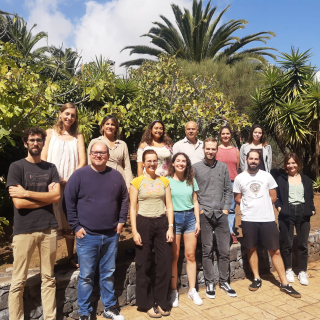Bibcode
Spitler, Lee R.; Forbes, Duncan A.; Beasley, M. A.
Referencia bibliográfica
Monthly Notices of the Royal Astronomical Society, Volume 389, Issue 3, pp. 1150-1162.
Fecha de publicación:
9
2008
Número de citas
37
Número de citas referidas
37
Descripción
Spitzer IR Array Camera (IRAC) mid-infrared photometry is presented for
the globular cluster (GC) systems of the NGC 5128 (`Centaurus A') and
NGC 4594 (`Sombrero') galaxies. Existing optical photometric and
spectroscopic are combined with this new data in a comprehensive
optical-to-mid-IR colour catalogue of 260 GCs. Empirical
colour-metallicity relationships are derived for all optical-to-mid-IR
colour combinations.
These colours prove to be very effective quantities to test the
photometric predictions of simple stellar population (SSP) models. In
general, four SSP models show larger discrepancies between each other
and the data at bluer wavelengths, especially at high metallicities.
Such differences become very important when attempting to use
colour-colour model predictions to constrain the ages of stellar
populations. Furthermore, the age-substructure determined from
colour-colour diagrams and 91 NGC 5128 GCs with spectroscopic ages from
Beasley et al. is inconsistent, suggesting any apparent GC system
age-substructure implied by a colour-colour analysis must be verified
independently.
Unlike blue wavebands, certain optical-to-mid-IR colours are insensitive
to the flux from hot horizontal branch stars and thus provide an
excellent metallicity proxy. The NGC 5128 GC system shows strong
bimodality in the optical R band to mid-IR colour distributions, hence
proving it is bimodal in metallicity. In this new colour space, a
colour-magnitude trend, a `blue tilt', is found in the NGC 5128
metal-poor GC data. The NGC 5128 young GCs do not contribute to this
trend. In the NGC 4594 GC system, a population of abnormally massive GCs
at intermediate metallicities shows bluer optical-to-optical colours for
their optical-to-mid-IR colours, suggesting they contain extended
horizontal branches and/or are younger than typical GCs. Analysis of
optical-to-mid-IR colours for a ultracompact dwarf galaxy suggests its
metallicity is just below solar.
Proyectos relacionados

Huellas de la Formación de las Galaxias: Poblaciones estelares, Dinámica y Morfología
Bienvenida a la página web del g rupo de investigación Traces of Galaxy Formation. Somos un grupo de investigación amplio, diverso y muy activo cuyo objetivo principal es entender la formación de galaxias en el Universo de una manera lo más completa posible. Con el estudio detellado de las poblaciones estelares como bandera, estamos constantemente
Ignacio
Martín Navarro